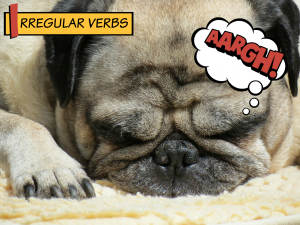Irregular Verbs In English

For learners of English, the past tense of irregular verbs is pure horror. But it doesn’t have to be! Most of the time, all you really need is an overview to wrap your head around the business of irregular verbs. Add some easy to remember rules and suddenly irregular verbs aren’t as scary anymore.
In an earlier article we have already looked at the past tense of catch, bring, buy, etc. Now, it’s time to have a look at the remaining irregular verbs!
Groups Of Irregular Verbs
Irregular verbs can be divided into groups that all share a similar behavior. Grouping them gives you a great overview and makes it easier to learn the groups’ members by heart.
- Same Form
- Vowel Change
- Different Endings
- Completely Different Forms
- More Than One Form
Same Form
Some irregular verbs in English have the same form in their infinitive, simple past, and past participle. Check out these examples and you will see that all forms look exactly the same even though they may differ in pronunciation:
| infinitive | simple past | past participle |
| cost | cost | cost |
| cut | cut | cut |
| hit | hit | hit |
| put | put | put |
| read | read | read |
Vowel Change
Many irregular vowels differ between infinitive and simple past with regard to their vowel. Following are some examples:
| infinitive | simple past | past participle |
| beat | beat | beaten |
| become | became | become |
| break | broke | broken |
| feed | fed | fed |
| ride | rode | ridden |
Looking at the table above, you can group these irregulars even further, namely with regard to how the forms differ from one another.
- infinitive and simple past are the same (cf. beat)
- infinitive and past participle are the same (cf. become)
- simple past and part participle are the same (cf. feed)
- all three forms are different (cf. break and ride)
Different Endings
Another group to put irregular verbs into is those where the ending differs between infinitive and the past forms. The vowel changes in these cases oftentimes as well.
| infinitive | simple past | past participle |
| bend | bent | bent |
| buy | bought | bought |
| creep | crept | cept |
| pay | paid | paid |
| tell | told | told |
Completely Different Forms
The irregular verb go has completely different forms for it’s simple past that can hardly be derived from the infinitive:
| infinitive | simple past | past participle |
| go | went | gone |
More Than One Form
The last group of irregular verbs to look at has not only one, but two forms for the simple past. Sometimes, one form is more common than the other, or preferred by a different group of speakers (e.g. American and British English). Here are some examples:
| infinitive | form 1 | form 2 |
| dream | dreamt | dreamed |
| kneel | knelt | kneeled |
| lean | leant | leaned |
| shine | shone | shined |
| spit | spit | spat |
